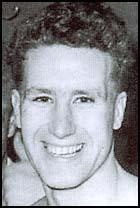Roy Swinbourne

Roy Swinbourne was born in Bamburgh on 25th August 1929. A centre-forward, he played junior football for Wath Wanderers before being signed by Ted Vizard, the manager of Wolverhampton Wanderers in September 1946.
Despite taking Wolves to third place in the 1946-47 season Ted Vizard was replaced by his assistant Stan Cullis in June 1948.
Swinbourne made his debut in the 1949-50 season. He joined a team that included Johnny Hancocks, Sammy Smythe, Jesse Pye, Jimmy Dunn, Jimmy Mullen, Billy Crook, Roy Pritchard, Dennis Wilshaw, Bert Williams, Bill Shorthouse, Billy Wright and Terry Springthorpe. That season Swinbourne scored 7 goals in 20 league games.
Stan Cullis was a great admirer of Swinbourne. In his autobiography, All For the Wolves, he pointed out: "Tall and strong, Swinbourne could gain possession of the ball on the ground and, in the air, he could beat most defenders. As he learned, and removed the rough edges from his game, he developed into a first-class centre-forward for Wolves"
Wolves only finished in 14th place in the First Division in the 1950-51. However, Swinbourne was the club's top goalscorers with 20 goals. Wolves had another disappointing season in the 1951-52 season finishing in only 16th place. Swinbourne only managed 4 goals in 19 games.
In the 1952-53 season Wolves finished in 3rd place in the First Division. Swinbourne was once again top scorer with 21 goals in 41 games. He joined up well with fellow forwards, Dennis Wilshaw (17), Jimmy Mullen (11), Johnny Hancocks (10) and Peter Broadbent (5).
Wolves won the First Division championship in the 1953-54 season with four more points than their nearest challenger, West Bromwich Albion. They scored an impressive 96 goals. Swinbourne got 24 in 40 but was only third in the list behind Johnny Hancocks (25) and Dennis Wilshaw (25).
Swinbourne was injured early in the 1954-55 season and only managed to play in 14 games. Despite the goals of Johnny Hancocks (26) and Dennis Wilshaw (20) Wolves could only finish second to Chelsea. Swinbourne also struggled with injuries the following season and once again could only play in 14 league games. His place in the side was taken by Jimmy Murray who scored 11 goals that season.
Swinbourne was forced into retirement at the end of the 1954-55 season. As Stan Cullis pointed out "although he tried for nearly two years to find his old speed, Swinbourne never recovered from that accident and... football lost a potentially great centre-forward." Swinbourne had scored 107 goals in 211 league games for Wolves.
Primary Sources
(1) Stan Cullis, All For the Wolves (1960)
In 1950, I was fortunate in that I had an ideal player for this type of game in Roy Swinbourne, the young Yorkshireman who came to Molineux from Wath Wanderers, the nursery team of Wolves which is run by Mark Crook, one of our old players. Tall and strong, Swinbourne could gain possession of the ball on the ground and, in the air, he could beat most defenders. As he learned, and removed the rough edges from his game, he developed into a first-class centre-forward for Wolves and was just coming to the peak of his career when he injured a knee in the last minute of a game at Preston.
This unfortunate injury happened early in the 1954-55 season and, although he tried for nearly two years to find his old speed, Swinbourne never recovered from that accident and now he has to be content to referee local games in Wolverhampton. Although the game may have found a first-rate official, football lost a potentially great centre-forward.
